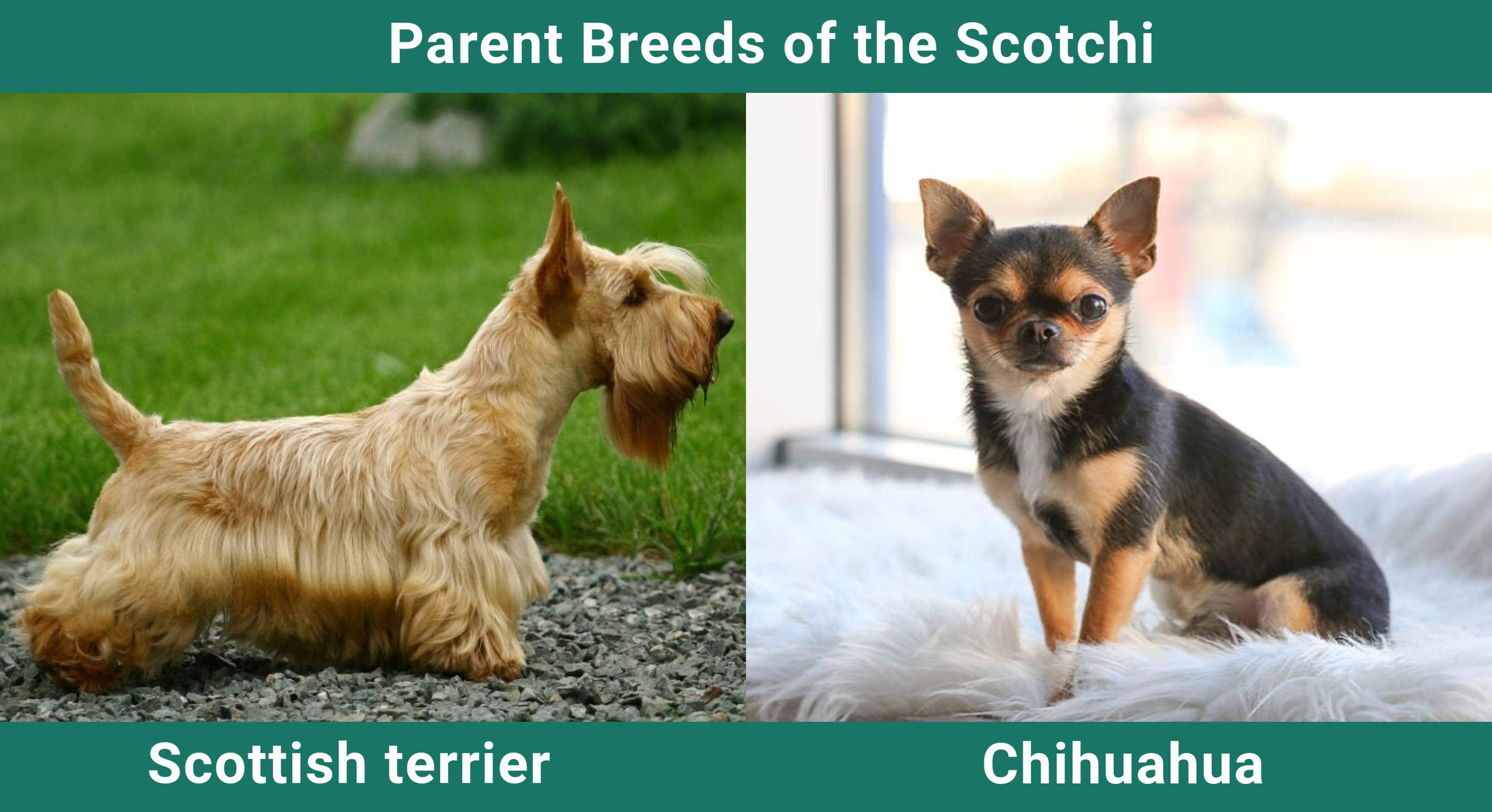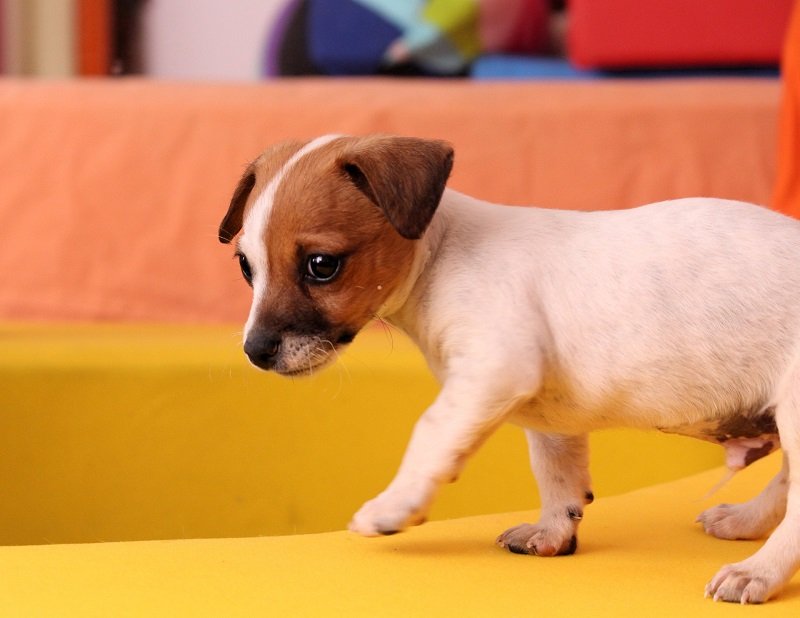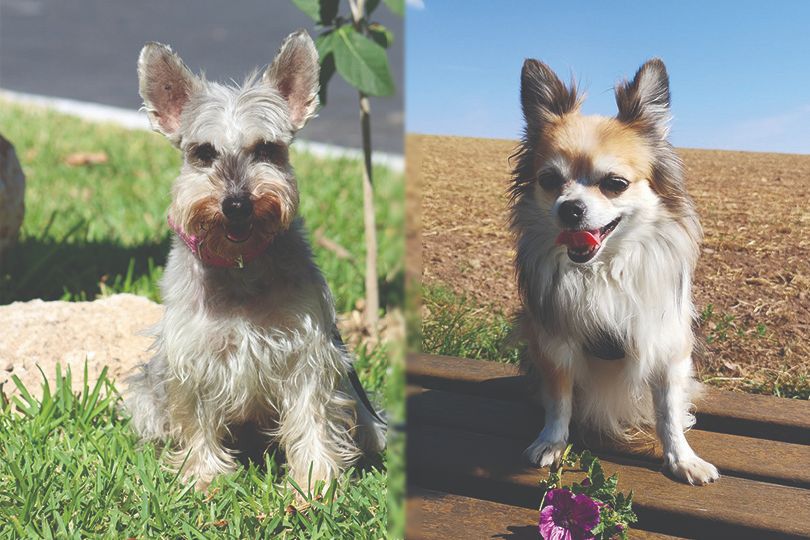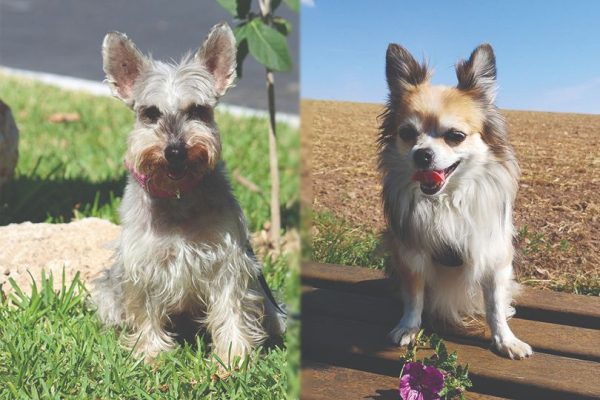Click Below to Skip Ahead
Also known as the Scotchahua, the Scotchi is a hybrid breed, a cross between the adorable Scottish Terrier and the feisty Chihuahua. Not much is known about this designer breed, although they likely first appeared in the mid-90s as one of many designer breeds becoming popular during the period. Let’s take a quick look at the Scotchi’s parent breeds to find out more about this feisty little pooch.
The Scottish Terrier is an ancient breed known for their independence and somewhat aloof personality. They are sensitive dogs that are extremely devoted to their owners, but they adapt well to a variety of living environments, be it farms or small apartments.
Breed Overview
Height:
8 – 11 inches
Weight:
16 – 20 pounds
Lifespan:
12 – 15 years
Colors:
Black, grey, brown, red, fawn, white
Suitable for:
Families, couples, apartment living, seniors
Temperament:
Energetic, bold, confident, devoted, sweet, playful, sensitive
The Chihuahua originated in Mexico in the mid-1800s, named after the state of Chihuahua, where the breed was initially developed. They have become popular dogs around the world and are among the most popular breeds in the United States. They are known for being bold, feisty, and confidant dogs, with a large personality that barely fits into their tiny body!
With parent breeds like the Scotty and Chihuahua, there is no doubt that the Scotchi will be a unique pooch indeed. If we’ve piqued your interest so far, read on for more in-depth information on this tiny designer breed.
Scotchi Puppies
Before bringing home a Scotchi puppy, it’s important to know that these dogs have a surprising amount of energy for their small size. They are attention-demanding pooches that need to be around their owners as much as possible. These dogs do not do well if left alone for long periods, and if you’re away from home frequently, they are, unfortunately, not an ideal choice for you.
Scothis are great little family pooches but are best kept as the only dog in the home, as they have a bark much bigger than their bite that can often get them into trouble! Make sure to read the full care guide so you know what they need in terms of food, exercise, and grooming to grow into happy and healthy dogs.

Temperament & Intelligence of the Scotchi
Scotchis are active, energetic, and happy dogs that love to spend most of their time playing. When they’re not entertaining themselves by chasing whatever comes into their view, they are content cuddling in their owner’s lap. Scotchis are highly adaptable dogs that do well in apartments or running free on farms but are sensitive animals that need almost constant companionship with their owners. Without this, they can quickly become aggressive and will suffer from separation anxiety.
They tend to bond strongly with one owner, and this trait is what often gets them into trouble! Their strong bond with their favorite human can lead them to become protective at times, and they’ll take on any humans or dogs that they see as a threat. This is why they need plenty of training and socialization from a young age.
They are sweet dogs, though, and love nothing more than being close to their human family and soaking up all the attention that they can get. It’s important to note that these dogs are notorious yappers and will bark at almost anything and everything that they deem as a potential threat. This can naturally be a problem if you live in an apartment with close neighbors.
Are These Dogs Good for Families?
Scotchis make great family pooches and generally get along great with children. They love to play and will spend hours playing in the backyard with the kids. They have a surprising amount of energy despite their small size. They also have a strong protective instinct and need proper socialization, as they can be wary of new faces.
Does This Breed Get Along With Other Pets?
Scotchis are generally best kept in a one-dog home, as they are not great with other dogs. With early socialization, this can be largely overcome, but unless they have grown up with other dogs, it can be difficult to get them to be peaceful toward other dogs, even much larger pooches! Both the Scotchi’s parent breeds have a history of ratting, so any small pets like guinea pigs or rats should be kept far away from your Scotchi!
Things to Know When Owning a Scotchi
Food & Diet Requirements
Scotchis are small pooches and don’t have a big appetite. Around 1–2 cups of high-quality kibble split into two meals per day are ideal, and you can supplement this with lean meats or canned food for welcome variety. Check that the food that you choose to feed your Scotchi has an animal protein as the first-listed ingredient and that there are ideally no artificial colors, flavors, or preservatives.
Due to their small size, these dogs are prone to being overweight, so in addition to regular exercise, you’ll need to feed them a healthy balanced diet and be careful of overfeeding to avoid obesity. This is why we advise against free-feeding your pooch; it’s far better to split up their meals and pick up whatever is left over. Lastly, make sure they have access to fresh, clean water at all times.
Exercise
Scotchis are active little pooches, and they need daily exercise to keep them healthy and happy and prevent them from getting bored. Around a minimum of 1 hour per day is ideal for Scotchis, although they’d probably be happier with more than that! They love walks or jogs around the neighborhood or dog park and are always up for a play session in the backyard. Mental stimulation is also important, so interactive games like fetch or hide and seek are vital parts of your dog’s exercise routine.
Training
Scotchis are known to be somewhat stubborn, and this can make training a challenge. Early socialization and training are crucial for these feisty little dogs, though, and you’ll need to be dedicated and extremely patient during the training process. Without proper training and socialization, these dogs can be highly overprotective and will often act aggressively toward dogs much bigger than themselves in the protection of their owners, which can have unfortunate consequences.
It’s best to use positive reinforcement training methods with these little dogs, as they are highly sensitive and do not respond well to harsh training techniques. Training a Scotchi will require commitment and consistency, but the reward will be worth it in the end! Since these dogs are fairly challenging to train, they are not recommended for first-time dog owners.
Grooming ✂️
Most Scotchis inherit the short coat of their Chihuahua parent, but they can be found with long coats too. Either way, grooming is relatively easy because these pooches do not shed that much, and you’ll only need to give them a light brushing two to three times per week to get rid of any dead hair. Try to avoid bathing your Scotchi unless they are filthy, and even then, use just warm water or special dog shampoo, as bathing them too often can strip their coat of its natural oils.
Other than that, you’ll need to brush their teeth occasionally to avoid dental issues, which these small dogs are fairly prone to, and clip their toenails every 6 weeks or so.

Health and Conditions
Scotchis benefit from hybrid vigor, or heterosis, the health benefits derived from cross-breeding, and are healthy dogs overall. Of course, there is always the chance that they may develop the hereditary health issues that either of their parent breeds could suffer from, as well as other common health issues that affect small dogs.
- Allergies
- Obesity
- Dental issues
- Patellar luxation
- Hip dysplasia
- Hypoglycemia
- Von Willebrand’s disease
- Collapsed trachea
Male vs. Female
There is little difference between male and female Scotchis, even in size. Common generalizations of sex differences may apply, such as females being more independent and less needy and males being more territorial and prone to aggression, but these are not certainties by any means. Unless you intend on breeding, spaying, and neutering are highly recommended and will further mitigate any hormonal differences there may be between males and females.
It’s important to remember that all dogs are unique individuals, and your Scotchi’s personality will be far more affected by their upbringing and training than their sex.
3 Little-Known Facts About the Scotchi
1. Their origins are a mystery.
Both the Scottish Terrier and Chihuahua have somewhat mysterious origins. Scottish Terriers, as their name suggests, come from Scotland, but little else is known about their development. Chihuahuas were named after the Mexican state where they originated, and there are varying theories about their exact origins. Just like those of their parent breeds, Scotchi’s origins are not known beyond being a part of the “Designer Dog” boom in the mid-90s.
2. They are expert ratters.
Scottish Terriers were originally used for ratting, and their tiny size and powerful nose made them experts at the job. They are also exceedingly brave when facing large rodents, badgers, or even larger dogs, a trait that can certainly be problematic at times! In Mexico, it’s not uncommon to see Chihuahuas being used as ratters, so with parent breeds like this, your Scotchi will be an expert ratter too!
3. They have a bark far bigger than their bite.
Both Scottish Terriers and Chihuahuas have reputations for being feisty, protective, and ferocious dogs despite their small size. These pooches will take on dogs much larger than them in the protection of their family, without a hint of any fear! This can be problematic at times, to say the least, and your Scotchi will need plenty of socialization to keep them out of trouble.
Final Thoughts
The Scotchi is feisty, active, and bursting with personality, and there’s never a dull moment when you bring one of these little pooches home! Scotchis love to be close to their human family, and they’ll soon become a little shadow that rarely leaves your side. They are great family dogs, although they prefer to be the only dog in the home. With socialization and training, though, they can get along with other pooches. Scotchis are adaptable dogs that can happily live in apartments, but they are known for their almost constant yapping, which can be an issue with close neighbors!
Scotchis are notoriously overconfident and protective of their family, a trait that can get them in serious trouble, so good training and socialization are vital. All in all, Scotchis make wonderful pets, and they will be a constant source of affection and entertainment!
Related Reads:
- Jindo Terrier Mix: Pictures, Care, Info & More
- Scoland Terrier (Westie & Scottie Mix): Care, Pictures, Info & More
Featured Image Credit: Left – Scottish terrier (andreascarlofotografia, Pixabay); Right – Chihuahua (MichaelaSchmitt, Pixabay)









